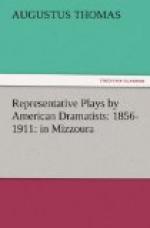INTRODUCTION
The present volume of “Representative Plays by American Dramatists” includes many hitherto unpublished manuscripts. These are for the first time made available in authoritative form to the student of the American theatre. The Editor has tried consistently to adhere to his original basis of selection: to offer only those texts not generally in circulation and not used elsewhere in other anthologies. Exactions of copyright have sometimes compelled him to depart from this rule. He has been somewhat embarrassed, editorially, by the ungenerous haste with which a few others have followed closely in his path, even to the point of reproducing plays which were known to be scheduled for this collection. For that reason there have been omitted Mr. William Gillette’s “Secret Service,” available to readers in so many forms, and Mr. Percy Mackaye’s “The Scarecrow.” No anthology of the present historical scope, however, can disregard George Henry Boker’s “Francesca da Rimini” or Bronson Howard’s “Shenandoah.” In the instance of Mr. Langdon Mitchell’s “The New York Idea,” it is possible to supersede all previous issues of this refreshing comedy by offering a text which, as to stage directions, has been completely revised by the author. Mr. Mitchell wishes to have this regarded as the correct version, and has himself prepared the “copy” of same. Because of the easy accessibility of Dion Boucicault’s “The Octoroon; or, Life in Louisiana,” it was thought best to omit this Irish-American playwright, whose jovial prolixity enriched the American stage of the ’60’s and ’70’s. His “London Assurance” is included in the present Editor’s collection of “Representative British Dramas: Victorian and Modern.”
Of more historical significance than Joseph Jefferson’s final version of “Rip Van Winkle,” are the two texts upon which Boucicault and Jefferson based their play. It has been possible to offer the reader a comparative arrangement of the John Kerr and Charles Burke dramatizations.
In the choice of Steele Mackaye’s “Paul Kauvar; or, Anarchy” a period is illustrated which might be described as transitional. Executors of the Augustin Daly estate are not ready to allow any of Daly’s original plays or adaptations to be published. The consequence is “Paul Kauvar” must stand representative of the eighteen-eighty fervour of Lester Wallack, A.M. Palmer, and Daly, who were in the Mackaye tradition.
Oliver Bunce’s “Love in ’76” has been selected for the same reason that one might select Clyde Fitch’s Revolutionary or Civil War pieces—because of its bloodless character; because it is one of the rare parlour comedies of the period.




